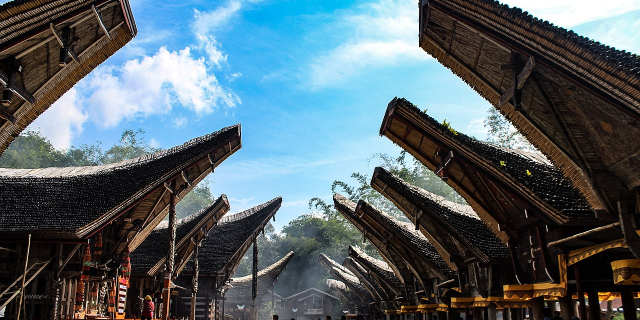Torajan people

From the 17th century, the Dutch established trade and political control on Sulawesi through the Dutch East Indies Company. Over two centuries, they ignored the mountainous area in the central Sulawesi, where Torajans lived, because access was difficult and it had little productive agricultural land. In the late 19th century, the Dutch became increasingly concerned about the spread of Islam in the south of Sulawesi, especially among the Makassarese and Bugis peoples. The Dutch saw the animist highlanders as potential Christians. In the 1920s, the Reformed Missionary Alliance of the Dutch Reformed Church began missionary work aided by the Dutch colonial government.[1] In addition to introducing Christianity, the Dutch abolished slavery and imposed local taxes. A line was drawn around the Sa'dan area and called Tana Toraja ("the land of Toraja"). Tana Toraja was first a subdivision of the Luwu kingdom that had claimed the area.[2] In 1946, the Dutch granted Tana Toraja a regentschap, and it was recognised in 1957 as one of the regencies of Indonesia.[1]
Early Dutch missionaries faced strong opposition among Torajans, especially among the elite, because the abolition of their profitable slave trade had angered them.[3] Some Torajans were forcibly relocated to the lowlands by the Dutch, where they could be more easily controlled. Taxes were kept high, undermining the wealth of the elites. Ultimately, the Dutch influence did not subdue Torajan culture, and only a few Torajans were converted.[4] In 1950, only 10% of the population had converted to Christianity.[3]
In the 1930s, Muslim lowlanders attacked the Torajans, resulting in widespread Christian conversion among those who sought to align themselves with the Dutch for political protection and to form a movement against the Bugis and Makassarese Muslims. Between 1951 and 1965 (following Indonesian independence), southern Sulawesi faced a turbulent period as the Darul Islam separatist movement fought for an Islamic state in Sulawesi. The 15 years of guerrilla warfare led to massive conversions to Christianity.[5]
Alignment with the Indonesian government, however, did not guarantee safety for the Torajans. In 1965, a presidential decree required every Indonesian citizen to belong to one of five officially recognised religions: Islam, Christianity (Protestantism and Catholicism), Hinduism, or Buddhism.[6] The Torajan religious belief (aluk) was not legally recognised, and the Torajans raised their voices against the law. To make aluk accord with the law, it had to be accepted as part of one of the official religions. In 1969, Aluk To Dolo ("the way of ancestors") was legalised as a sect of Agama Hindu Dharma, the official name of Hinduism in Indonesia.[1]
































Afegeix un nou comentari